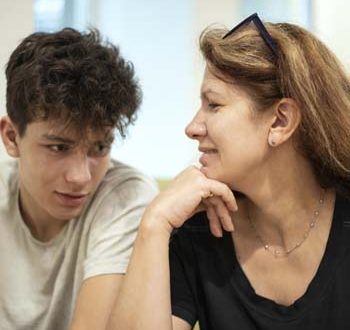
Communicating with a teenager can undoubtedly be a challenge. This is most certainly the case when it comes to what they are doing when they are online. Many of the parents we meet in the course of our work in Zeeko have genuine concerns about what their child is potentially, exposed to when they are online. Concerns like this are absolutely understandable. Here are some tips to help you communicate with your teen about what they are doing online.
Open Communication; it’s the key! It’s important that children of all ages know that it is ok to come to a parent or another trusted adult to talk about what they are experiencing when they are online. The good and the bad stuff. If your child feels it is safe to come to you to discuss something that has upset or distressed them without the fear of being judged or punished, then they are more likely to do so. It can be a particular challenge to communicate with teenagers, but it is achievable. Regularly remind your teen that you are there for them and that they can come to you to discuss anything that has upset or distressed them or their friends, when they are online. Of course, due to their stage of development teenagers often struggle to find their own identity and do like to sometimes keep secret what they are doing and who they are interacting with. An open communication style is a great foundation from which your teen can more safely engage in their digital journey.
Encourage Digital Citizenship: This may sound out of reach, but it really isn’t. It essentially means encouraging your teen to make smart choices when they are online, to think of others when they comment and share content online and to be conscious of their digital footprint. When we visit secondary schools throughout Ireland to talk to teenagers about staying safe online, it is really interesting to see how teens view the internet. For example they don’t always realise that when they share something and then delete it that it is not always permanently deleted and something that they share today may still be online months later. Promoting responsible digital citizenship is only in development in Ireland, but the best lessons are learned in your own home and if your teen is encouraged by you to practice responsible internet use then they are likely to spread that message among their peers.
Talk to Other Parents: Parents can be a great support and sounding board for each other! Take opportunities to talk to other parents about the strategies they use when dealing with their child’s digital journey. There is a lot to be gained from the sharing of experiences. It can also help to know that you are not alone in dealing with the challenges of communicating with your teenager.
Reinforce the Importance of Staying Safe Online: Reinforcing the basic messages about staying safe online has to be a consistent key component of communicating with your child about what they are doing online. Regularly remind them to behave in the same way they would when they are online as they do when they are offline, in particular exercising the same degree of caution when or if they encounter someone they don’t know online. Remind them too about the potential for cyberbullying in interactions that they have online, even among friends. As we outlined in the first point of this blog, make sure that your child knows they can always share with a trusted adult something that has upset or distressed them online.
Finally, regularly remind your teen that there is an off switch on all digital devices and that balance is best in relation to the amount of time they spend using these devises!
Explore Zeeko’s Home Page to discover our mission on the About Us Page, innovative Phone Blocking System, and engaging Phoenix Quest 10 programme. We provide Internet Safety Seminars, the Zeeko Report Card, and the Magical Leaders Choose Country initiative, alongside insights from our Digital Trend Report. Stay connected with us on Facebook and Instagram for updates.

